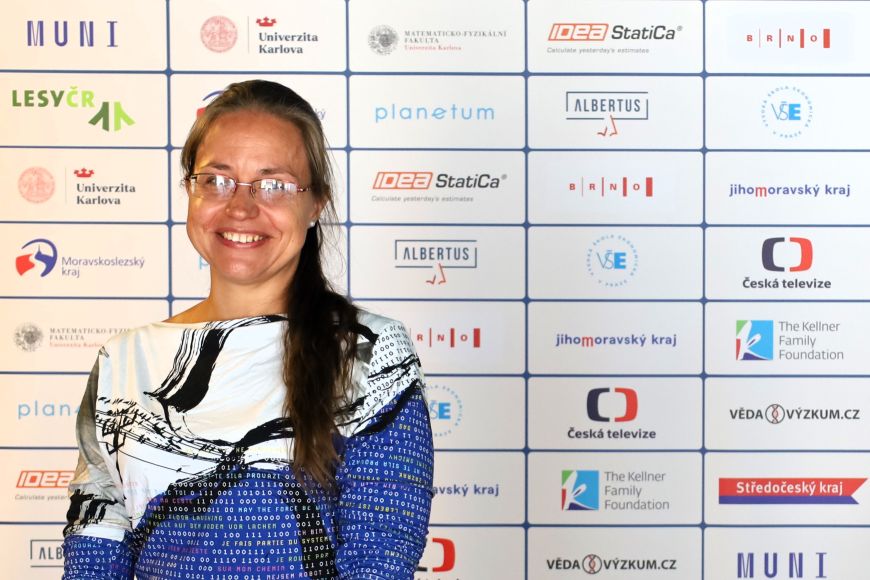Jana Fialová, Vice-Rector for Student Affairs and External Relations, spoke before the awards ceremony about how much Masaryk University values its partnership with the Česká hlavička (meaning “Little Czech Head”) competition and explained the reasons that lead Masaryk University to support it. “We have been supporting secondary school students for a long time, to show them that they can work with our university already at high school and that our researchers can help them. It is a great benefit for the university when they come to us to do research – we can work with them, motivate and support them and we hope that they will come back to study with us,” said the Vice-Rector.
One of the winners of this year's award, Evelína Voleská from the Česká Třebová Gymnasium, is an example of cooperation that should last into university studies. Voleská won the Sanistas “Human Life and Health” award, whose partner is the MU Faculty of Medicine. She worked on her paper entitled Neuropathic Pain and Immunoreactive Dynamics: Investigating the Effect of Paclitaxel on Brain Ventricular Macrophages at the Department of Anatomy of the MU Faculty of Medicine and plans to start her studies in General Medicine in Brno next year.
“I was thinking about going to medical school when I was looking for a way to get involved in science at secondary school. I was able to do this through the faculty’s Junior Academy, where I applied with my own topic. But that didn't work out, so I applied for one of the open topics and the supervisor chose me, so now I’m part of the research group,” says Voleská.
Behind the complex title of her paper is research into long-term pain caused by damage to the nervous system, which is one of the side effects of some types of chemotherapy. She focused on the drug paclitaxel, which is used to treat breast, ovarian and lung cancer. In addition to cancer cells, the drug damages cells in the central and peripheral nervous system, which activates the inflammatory process associated with neuropathic pain. Research is focused on discovering the underlying mechanisms behind the spread of inflammation, particularly in a part of the brain called the choroid plexus. “We are expanding the research with further experiments, and I hope to continue it during my medical studies,” says Voleská. You can read more about her research in an interview for the Faculty of Medicine’s website.
Tereza Przeczková from the Mendel Gymnasium in Opava won the Genus “Nature Around Us” prize, which is awarded in partnership with the MU Faculty of Science. In her seminar work entitled Structural analysis of the binding site for the inhibitor phloretin in the human Na+/H+ antiporter NHA2, she studied a specific protein that ensures the transfer of ions into cells. This protein, known as the NHA2 antiporter, is involved in the rate of insulin release, sperm motility and a number of other functions.
Česká hlavička is awarded to students selected by an expert jury. The Merkur “Man and Society” prize (sponsored by the Prague University of Economics and Business) went to Vojtěch Eibel from the Jan Blahoslav Gymnasium in Ivančice, the Intentio “Sustainable Development” prize (sponsored by Charles University) to Martin Obšil, David Orlík and Jonáš Tomešek from the Wichterle Gymnasium in Ostrava-Poruba, the Futura “Solutions for the Future” prize (sponsored by IDEA StatiCa) went to Jiří Sankot and Adam Křen from the Secondary School of Electrical Engineering in Plzeň, and the Universum “Man and Science” prize (sponsored by the Faculty of Mathematics and Physics of Charles University) went to Vít Perkner from the Scio Secondary School in Prague-Žižkov.
In addition to the Česká hlavička, the Albertus awards were also presented in Brno to interesting and inspiring teachers of informatics and mathematics. Among the four winners was Lucie Drimlová, a graduate of the MU Faculty of Informatics, who has been teaching informatics and computer technology at the Vídeňská Gymnasium in Brno for ten years.

“I started lecturing at the age of 14 when I organised computer clubs at our gymnasium,” says Drimlová of her early days as a teacher. After a career in the commercial sector, she became a mother of five and started working at Vídeňská Gymnasium before the birth of her last child. “I still love the commercial sector and draw on it constantly in my work as a teacher,” she said, adding that she tries to teach students to avoid mindlessly tapping mobile screens, instead making it a conscious activity on their part that enables them to make decisions and behave safely and responsibly in a virtual environment.
